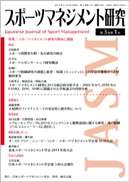Volume 3, Issue 1
Displaying 1-10 of 10 articles from this issue
- |<
- <
- 1
- >
- >|
Special Issue: Trends and Issues in Sport Management Studies
Review
-
2011 Volume 3 Issue 1 Pages 3-4
Published: November 30, 2011
Released on J-STAGE: December 21, 2011
Download PDF (153K) -
2011 Volume 3 Issue 1 Pages 5-21
Published: November 30, 2011
Released on J-STAGE: December 21, 2011
Download PDF (614K) -
2011 Volume 3 Issue 1 Pages 23-34
Published: November 30, 2011
Released on J-STAGE: December 21, 2011
Download PDF (337K) -
2011 Volume 3 Issue 1 Pages 35-43
Published: November 30, 2011
Released on J-STAGE: December 21, 2011
Download PDF (508K) -
2011 Volume 3 Issue 1 Pages 45-60
Published: November 30, 2011
Released on J-STAGE: December 21, 2011
Download PDF (363K)
Article
-
2011 Volume 3 Issue 1 Pages 61-76
Published: November 30, 2011
Released on J-STAGE: December 21, 2011
Download PDF (499K)
Research Note
-
2011 Volume 3 Issue 1 Pages 77-93
Published: November 30, 2011
Released on J-STAGE: December 21, 2011
Download PDF (469K)
International Conference Report
-
2011 Volume 3 Issue 1 Pages 95-99
Published: November 30, 2011
Released on J-STAGE: December 21, 2011
Download PDF (1483K) -
2011 Volume 3 Issue 1 Pages 100-104
Published: November 30, 2011
Released on J-STAGE: December 21, 2011
Download PDF (931K)
Conference Report
-
2011 Volume 3 Issue 1 Pages 111-114
Published: November 30, 2011
Released on J-STAGE: December 21, 2011
Download PDF (237K)
- |<
- <
- 1
- >
- >|
